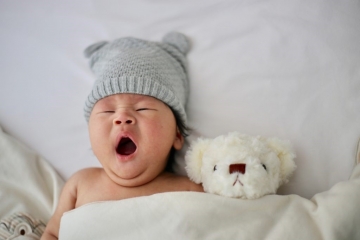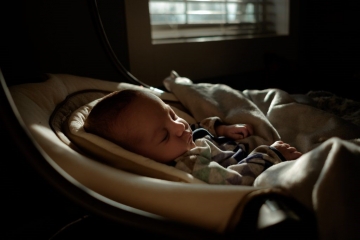
 7 Sleep Tips To Improve Your Baby's Sleep Quality
7 Sleep Tips To Improve Your Baby's Sleep Quality  The Importance of Sleep for Your Baby
The Importance of Sleep for Your Baby  Co-Sleeping With Your Child: Pros & Cons
Co-Sleeping With Your Child: Pros & Cons  Does My Baby Have Eczema? Causes & Treatments
Does My Baby Have Eczema? Causes & Treatments  What Is Healthy Sleep For My Baby?
What Is Healthy Sleep For My Baby? 
Overtiredness is a condition in between tiredness and exhaustion. It is a state of physical fatigue that activates the stress-response system.
An overtired baby is too tired to sleep and gets fussy. Even if she manages to fall asleep, she would wake up soon after and struggle to go back to sleep. The more the baby gets tired, the harder it is to put her to sleep, as she cannot control or express herself. To put it simple, an overtired baby just won’t sleep.
Can a little baby, who seemingly has little activity through the day, get really overtired? Yes, she can and it is interesting to know what makes her so tired.
The most common cause for overtiredness is sleep deprivation. Your little one learns several things during the day time. To process all of them, she needs regular naps. That is why babies have short awake hours, which extend with age. For example:
As your baby gets closer to finishing her awake time, she turns drowsy and is all set for a nap. This is the right time for you to settle down your little one, as she can fall asleep with ease.
But what if you do not put her to sleep at the right time? Well, she will have to produce more of cortisol and adrenaline hormones to stay awake. Now, this is stress! The cortisol and adrenaline hormones flood into the bloodstream, making it difficult for the little one to relax.
Note: Crying it out is not helpful for babies and could be stressful.
Signs Of Tiredness In Babies:
Why do babies cry when they are tired? Your baby could cry as the last resort after trying to communicate with you in several other ways. If you are asking, “In what way does she communicate with me?” then read on.
Understanding your baby’s cues will help your baby sleep. You need not have to deal with a grumpy baby. Doesn’t it sound great! Here are a few common and early cues of tiredness in babies.
If you miss all these signals the probable outcome is a fussy and crying baby. All these are late signs of an overtired baby. At this stage, a tired newborn cries without any apparent reason, pulls up legs in pain, and arches her back. An older baby puts up miserable behavior, rejects food, fights sleep, screams, and cries.
All these are signs of ‘Flight, Fright and Fight’ that are the classic response to stress hormones. A fussy baby means you surely have missed the bus!
Note: Sometimes, parents may not be able to differentiate between overtiredness of the baby and reflux and colic. Understanding the actual reason is important. Seek a doctor’s advice, if required.
What if you overlook these tiredness cues? You may have to deal with full out meltdowns, which could be a nightmare. Make efforts to calm down the exhausted baby.
Some babies are ready to sleep at the first signs of tiredness. But some need to be very tired before they fall asleep. You’ll know the difference as your baby grows.
Here’s what you can do when you see tired signs in your baby:
To calm down an older baby:
When a baby is tired, she may wake up soon after she falls asleep. So be ready to soothe her back to sleep.
If your baby is getting overtired frequently, she displays a different behavior. It is essential to figure it out and take necessary measures. Such a baby may:
Overlooking these behaviors could hamper the overall development of the baby. It is essential to prevent overtiredness by giving her enough naps. Keep reading to learn several ways to achieve this.
Keeping an eye on your little one and her activities would help her from getting tired frequently. These tips would be beneficial.
When you know that your baby goes to sleep at seven in the evening, be ready for her bedtime routine beforehand.
A. Your baby was happily playing around, creating a mess, and then she turns inconsolable. She just won’t settle down! Well, an overtired baby cries it out. They can neither realize nor express their tiredness and eventually cry. They fight to fall asleep.
A. Hormones and neurotransmitters play a role in the entire process. Melatonin and cortisol are the key hormones that govern sleep. The levels of these hormones keep changing all through the day, making it easy to fall asleep at certain times of the day.
Cortisol keeps us awake and alert. It peaks at 8am and begins to droop as the day progresses.
Melatonin prepares us to sleep.
By stimulating the brain to release more melatonin, you can help your little one fall asleep easily.
A calm, sleeping baby is like music to a mother’s ears! Then why not make a little effort to put the little one to sleep before she gets overtired? They key lies in reading the signs and symptoms. With practice, you can learn to decipher your baby’s unspoken words!
Subscribe to our mailing list and LIKE US on Facebook to stay updated on the latest parenting tips!
This post was originally posted on MomJunction
Copyrighted Pregnancy & Baby by Mummys Market 2019


